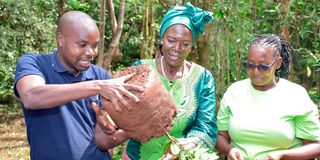Don’t just plant trees, nurture them to grow

From left: Elly Kogei, Forest Restoration Officer at Karura Forest, Dr Marie Rarieya, a scholar and advocate of gender and youth mainstreaming in agriculture and Loise Ndegwa, an environmental conservationist during a tree planting visit at Karura Forest to mark Earth Day. POOL/NATION MEDIA GROUP PHOTO
What you need to know:
- President William Ruto launched a tree restoration programme at the Ngong Hills Forest in December last year to kick-start his plan to plant 15 billion trees by 2032.
- Conservationists encourage citizens to take care of the seedlings they plant and ensure they grow into mature trees
Trees are of invaluable importance to the environment — they contribute to a rich healthy ecosystem.
Conservationists encourage citizens to take care of the seedlings they plant and ensure they grow into mature trees. Elly Kogei, a forest restoration officer at Karura Forest, explains factors to consider before planting tree seedlings.
“It is advisable to have the right tree for the right place, for the right purpose and at the right time,” he says.
He notes that site preparation and quality seedlings are critical to ensuring success, adding that seedlings are best planted out during the rainy season.
“The right tree species is the one that used to exist in that area that you want to restore,” he says.
Although single-use plastics are banned, plastic bags are still widely used for growing seedlings. The officer advises against tearing plastic bags while planting seedlings in order to promote reduction, reuse and recycling practices. This is achievable by massaging the seedling, which enables the soil to separate naturally from the plastic bag during growth.
“Massage the seedling, place it between your index and the middle fingers, then turn it upside down. If you did a good massage, you could easily pull out the plastic bag from the seedling; then you flip it back, lower it gently, making sure that the tree is straight,” Kogei says as he keenly demonstrates.
Once the seedling is in the hole, he advises backfilling it with soil up to where the soil was in the bag, careful not to cover or bury the seedling.
According to Kogei, after planting a seedling, it must be taken care of for three years before it can be allowed to grow on its own. Weeding occurs during this time, and depending on the species' growth rate, pruning can be done after one and a half years to allow the tree to grow.
“In Karura Forest, tree planting cost is Sh460. This is divided into three parts. The first part is for the seedling, the second part for site preparation and the third part for maintenance,” he says.
President William Ruto launched a tree restoration programme at the Ngong Hills Forest in December last year to kick-start his plan to plant 15 billion trees by 2032. Since then, various organisations, government officials and individuals have participated in nationwide tree-planting initiatives. For instance, Internews-Earth Journalism Network planted 100 trees at Karura Forest under the theme "Invest in our planet, grow a tree" in honour of Earth Day 2023.
Other environmentalists who attended the event planted seedlings and acknowledged the late Nobel Peace Prize Laureate Prof Wangari Maathai's struggles and perseverance in saving Karura Forest, which currently has indigenous species and offers ecological services. This one of a kind forest in the capital city provides recreational opportunities such as walking paths, caves, waterfalls, a lake, tennis courts and a football pitch.
“Trees help in the mitigation of climate change by absorbing carbon dioxide through photosynthesis and releasing oxygen, which gives us air. The trees also help protect the soil,” says Dr Marie Rarieya, a scholar and advocate of gender and youth mainstreaming in agriculture.
Kenya Forest Service (KFS) assists individuals and communities who want to plant seedlings. According to Joyce Nthuku, regional forest conservator, Nairobi Conservation Area, KFS helps those who approach them intending to plant seedlings within the forest in achieving their desires and nurturing those seedlings to grow. “We don’t allow people to come with their seedlings from outside because we have to align with the procedures and processes entrenched in the law,” she explains.





